Life in Afghanistan remains dire 2 years after collapse of U.S.-backed government

Nick Schifrin:
The U.N. says 20 million Afghans are hungry and more than two-thirds need aid to survive.
The U.S. is the single largest donor of humanitarian aid. But it keeps $3.5 billion in foreign reserves frozen and refuses to open an embassy in Kabul, where, today, the Taliban celebrated their prize, a country where even the youngest lives under their version of Islamic law.
Today, the U.N. said that, while the country is much less violent today than before 2021, more than 1,000 civilians have died in bombings and other violence.
For more than the situation in Afghanistan and U.S. policy toward the Taliban, we get two views.
Nader Nadery is former commissioner of the Afghan Independent Human Rights Commission. He's now a senior fellow at the Wilson Center, a Washington-based think tank. And Laurel Miller was former President Obama's special representative for Afghanistan and Pakistan. She's now president and chief executive officer of the Asia Foundation, a nonprofit development organization.
Thanks very much. Welcome both of you back to the "NewsHour."
ncG1vNJzZmivp6x7sa7SZ6arn1%2Bjsri%2Fx6isq2ejnby4e8uinZ5lmaN6orLGoZinoaOprq950Z6kmqGeqHqltdGeZGtlqZqus7%2BMmp2tnaJisLC4y5qnrJ1dpLNuwYysZJuZk6CypXnGqK2eqp6isq%2FA